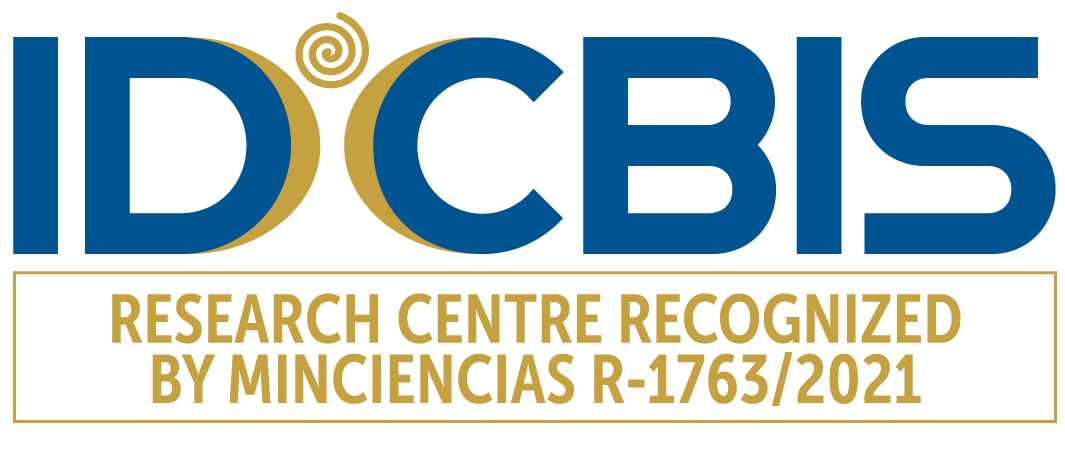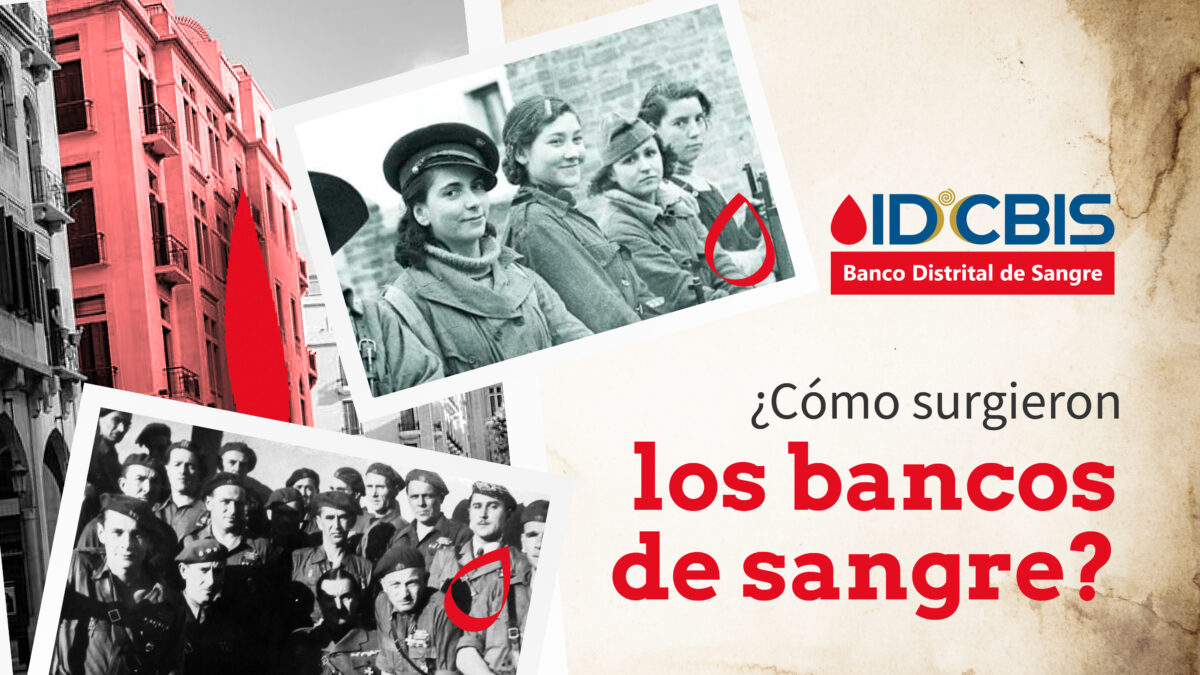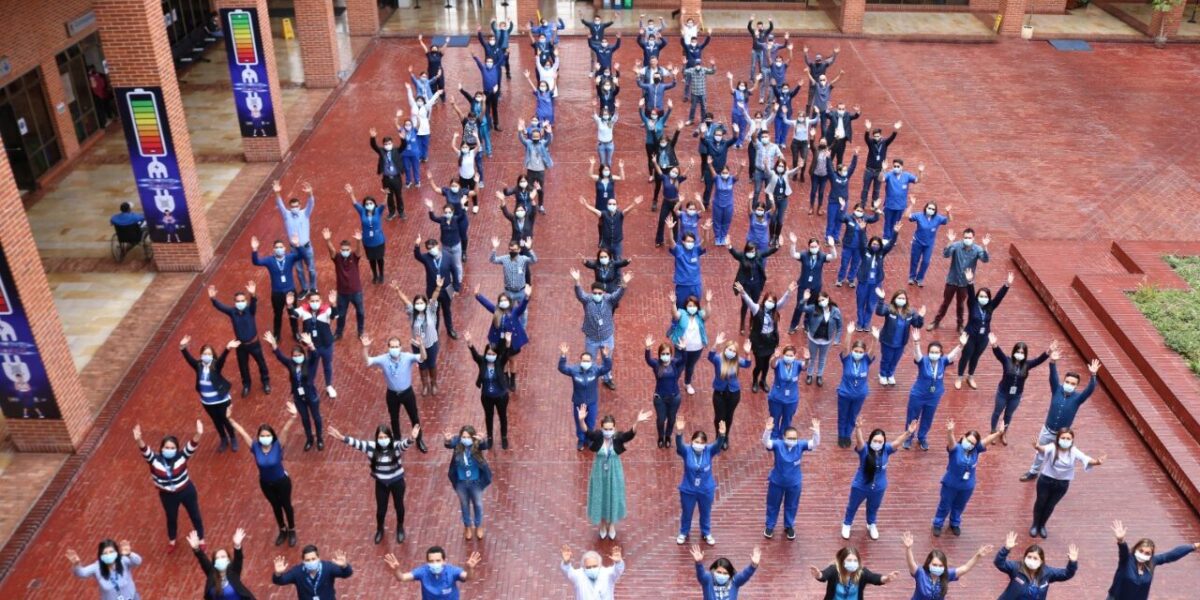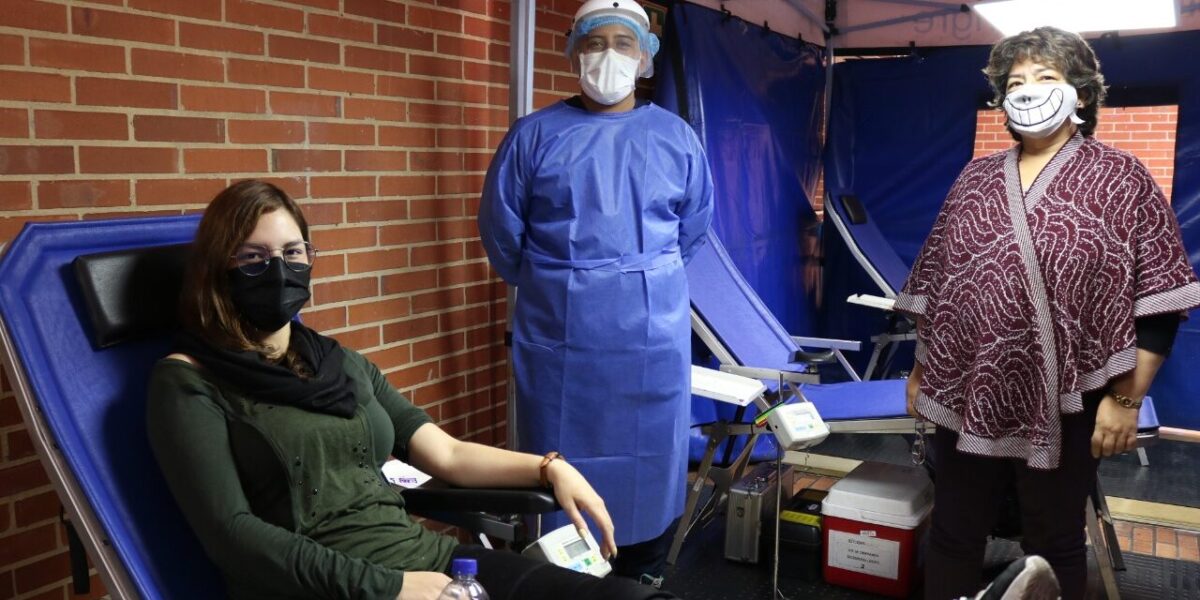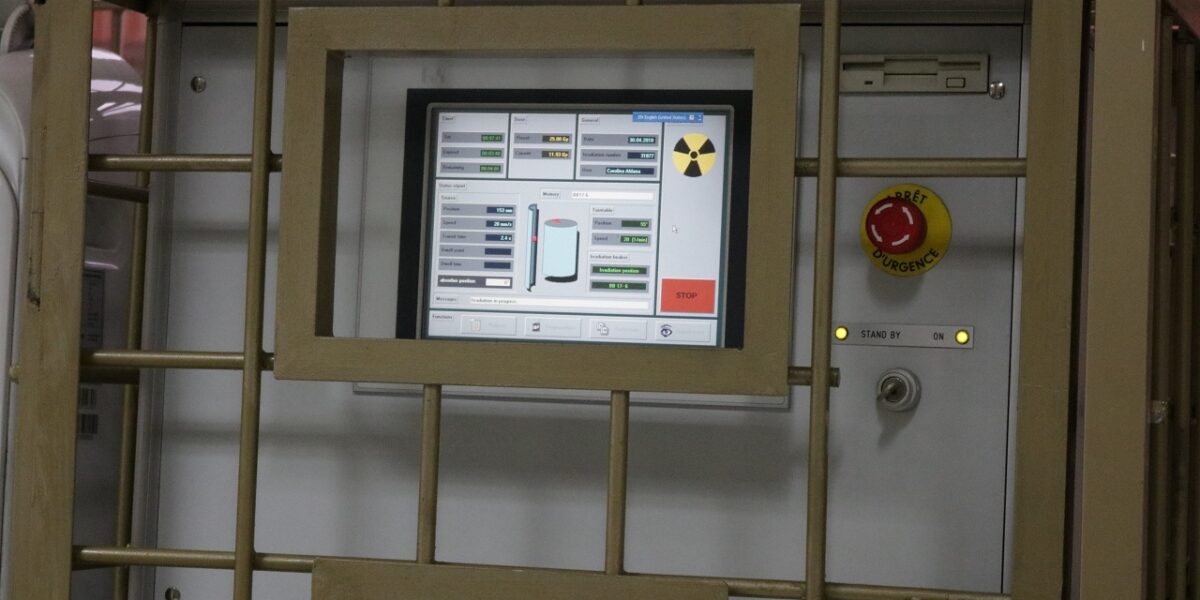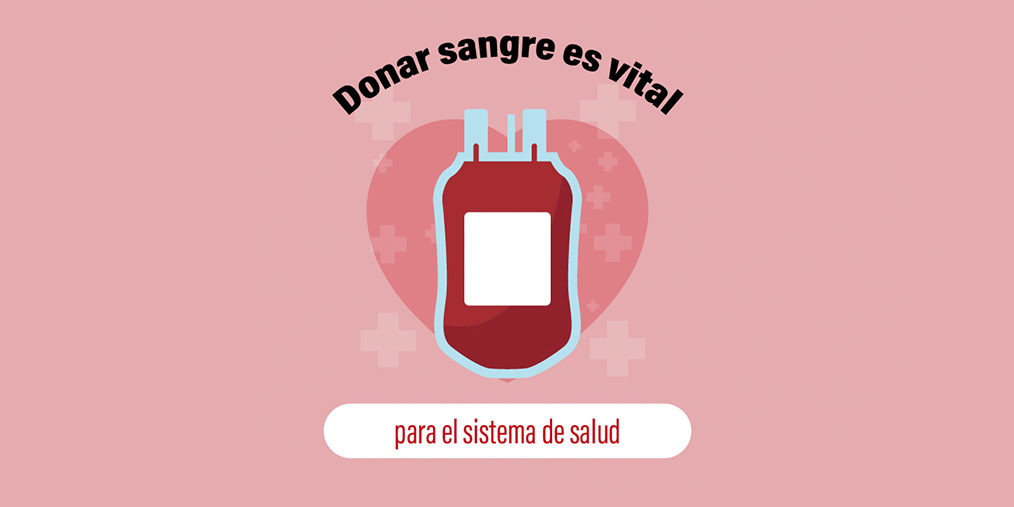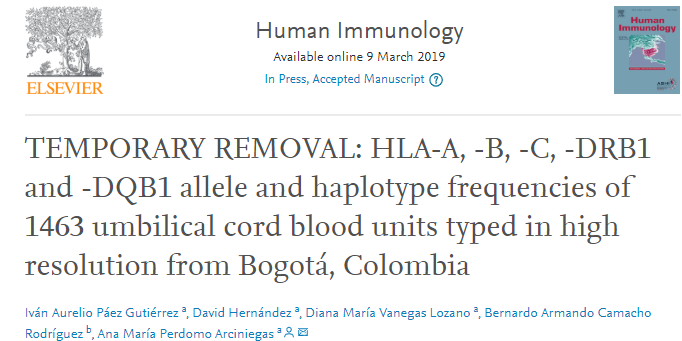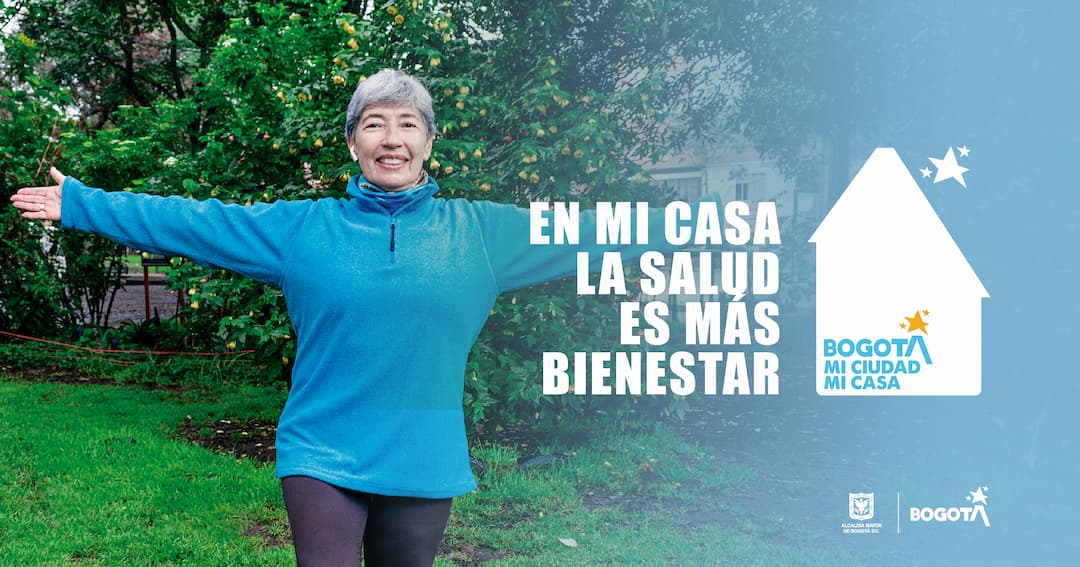Esta es la historia de uno de los primeros bancos de sangre, el cual surgió durante la Guerra Civil Española ocurrida el siglo pasado.
The donación de sangre en esa época era una experiencia distinta a la que vivimos hoy.
En esa época tenías que estar frente a frente con el paciente a quien le salvabas la vida. La conexión era de brazo a brazo.
Hoy contamos con procesos que además aseguran que la donación se realice de manera anónima . ¿Por qué se decidió crear un servicio como el banco de sangre? Entérate en este video.
Blog
The ISBT Working Party on Rare Donors is a prestigious global community with members in more than 18 countries.
Paula Andrea Gaviria, Leader of the Advanced Immunohematology Unit of IDCBIS, was selected by the "International Society of Blood Transfusion (ISBT)" as the most recent member of the "ISBT Working Party on Rare Donors", being the first Colombian and the third Latin American to achieve it.
The ISBT Working Party on Rare Donors aims to "provide a mechanism for collaboration between countries to enable the provision of rare blood products to patients in need".
According to the International Society of Blood Transfusion (ISBT), the group to which the IDCBIS collaborator now belongs is "a community eager to ensure that every patient who needs rare blood can receive it. This activity recognizes no political boundaries and is therefore all for the common good of patients all over the world".
The other two Latin American members of this group are Brazilian doctors Lilian Castilho and Silvano Wendel.
The District Institute of Science, Biotechnology and Innovation in Health (IDCBIS) is celebrating its fourth anniversary and the 20th anniversary of the District Blood Bank, formerly known as the District Hemocenter.
In March 2017, the District Institute of Science, Biotechnology and Innovation in Health (IDCBIS) was formally created with 9 founding entities: the District Health Secretariat, the four Integrated Health Services Sub-Networks of the District, the National University of Colombia, Los Andes, Javeriana, and the National Institute of Cancerology. Subsequently, the Colegio Mayor de Nuestra Señora del Rosario joined the board of directors.
During these 4 years the Institute has established itself as a pioneering health research center that has contributed to the development of science in Bogota and the country, thanks to its management lines such as: District Tissue Bank, District Blood Bank, Advanced Therapies Unit, Umbilical Cord Blood Bank and the National Registry of Hematopoietic Progenitor Cell Donors (DarCélulas).
Dr. Bernardo Camacho, director and manager of IDCBIS, said "we are proud to celebrate four years of service to the community, patients and science. Today we remember and celebrate the research, publications and contributions that have allowed our Institute to become a scientific heritage of our city and the country".
In addition to the celebration of the Institute, this year the District Blood Bank, formerly Hemocentro Distrital, completed 20 years in which it has established itself as a national and international reference bank for training and education of human talent in blood banking and transfusion services, capturing 673,817 donations and distributing 1,116,821 blood components.
Throughout these years the IDCBIS has worked permanently, not only in the promotion and strengthening of the culture of blood donation, but also of tissue donation, management that has made it worthy of the Civil Order of Merit "Dona Bogotá" in 2017, 2018, 2019 and 2020, a decoration of the City Council.
The Advanced Therapies Unit is in charge of research and development of products in transfusion, tissue and cellular medicine for use at pre-clinical scale and in clinical trials. Through this unit, the generation of knowledge and innovation in biomedical sciences is promoted through the articulation of actors in science and technology, consolidating a team of highly trained researchers who annually accumulate new publications in scientific journals and doctoral and master's theses.
Bogota City Council awarded in 2020 the Order of Merit to IDCBIS for its contributions to organ and tissue donation.
As for the Cord Blood Bank, since its creation in 2013, more than 9,000 units have been collected and 47 pediatric patients with severe blood diseases in hospitals in Bogota and Medellin have received transplants.
Within the framework of these efforts made in the Advanced Therapies Unit and the Umbilical Cord Blood Bank, in 2020 the IDCBIS put at the service of the city and the country a laboratory called White Room, due to its maximum environmental control conditions (temperature, humidity, air pressure and pollution), being the only one in Colombia of this large size (280m2 approximately) and degree of complexity. These state-of-the-art facilities put the Institute in a position to strengthen national and international scientific cooperation agreements and position it as a leader in the region in innovation in cell therapy, gene therapy and tissue engineering.
In addition, in 2020 IDCBIS announced the launch of a molecular immunohematology laboratory, the first of its kind in the country and the second in Latin America, which aims to solve complex erythrocyte and platelet compatibility diagnoses through its advanced immunogenic technology.
Finally, the Registry of Hematopoietic Progenitor Cells Donors, also called DarCélulas, is a project that is in the pilot phase and already has more than 1,900 people registered, being the first program in Colombia in which potential donors of blood-forming cells for patients with serious diseases such as leukemias, lymphomas, aplasia, among others, are registered. To date, more than 17 million people have been impacted through social networks.
During these 4 years, the Institute has worked hard in a coordinated manner to take advantage of each of its strategic lines in a joint effort in which the lessons learned from all the actions carried out at the Institute are used, making it a national and international reference in biomedical sciences.
You may be interested in: Colombia to have its first molecular immunohematology laboratory
Given the prevention measures taken in recent days in the city, some guidelines have been taken into account to maintain the supply of blood and blood components to the hospital network of the capital. One of them is the realization of blood donation days with strict biosecurity protocols.
Blood and blood components are essential biological products to guarantee permanent transfusions to patients (oncohematological, maternal, ICU, pediatric, renal, cancer and trauma) who require them throughout the city's hospital network.
The collection of blood components will take place in residential complexes and the fixed point of the District Blood Bank IDCBIS, located in the District Health Secretariat. Mobile units will move to mobilize duly identified blood bank personnel, as well as the transfer of donors to donation sites.
The general population is urged to carry out a previous registration to be contacted and to be able to coordinate the logistics to make the donation with all the biosecurity measures. The reactivation of the city also allowed the different hospitals to call for surgeries, which has doubled the need for blood components.
"The blood that is donated does not have a price, it has a value: life itself", says Dr. Bernardo Camacho, director of the District Institute of Science, Biotechnology and Innovation in Health, who asks for the solidarity of Bogota residents between 18 and 65 years of age in good health. Patients in different clinical situations require blood components as a priority to improve their health or save their lives.
Donation requirements are very simple
The IDCBIS District Blood Bank offers the service of irradiation of blood components, which consists of a treatment that is done by gamma radiation to red blood cells, platelets, single platelet concentrates (CUPs) and plasma, in order to inactivate the T lymphocytes present in these blood components and prevent Graft Vs. Host Disease (GVHD) in the recipient.
Optimal applications for the use of gamma irradiation are:
-Bone marrow transplant patients
-Patients with Hodgkin's disease
-Neonatal transfusion
-Immunosuppressed patients.
-Oncology patients
The IDCBIS District Blood Bank is the only one with specialized equipment for the irradiation of blood components and tissues using gamma irradiation with Cesium-137 with an optimal distribution of the dose throughout the blood component, which ensures that T lymphocytes do not proliferate.
The blood component irradiation service is provided 24 hours a day, 365 days a year to public and private institutions in Colombia.
The IDCBIS immunohematology laboratory performs the processing of the tests established by current legislation for blood donor samples and apheresis in fully automated platforms favoring a simple, fast, reliable and safe set-up.
Immunohematology referral service to all public institutions in the District and private institutions:
-Resolution of erythrocyte compatibilization cases.
-Extended studies for the diagnosis of autoimmune hemolytic anemia
-Support studies for the diagnosis and prevention of hemolytic disease of the fetus and newborn.
Tests for the identification of irregular antibodies, including allogeneic adsorption techniques, differential adsorption, differential adsorption with enzyme-treated red blood cells, among others.
It also has specialized professionals with extensive experience in the area, with postgraduate degrees and teaching experience, which has positioned the service as a training center for immunohematology with a clinical approach for residents of hematology, pediatric and adult hemato-oncology programs of the National University of Colombia and the University Foundation of Health Sciences - FUCS.
His research activities include the implementation of erythrocyte genotyping techniques, registration of donors with rare phenotypes and study of blood group system frequencies.
The Immunohematology service is provided 24 hours a day, 365 days a year to public and private institutions in Colombia.
The need for blood components in the public health system does not stop and the District Blood Bank IDCBIS, linked to the District Health Secretariat of Bogota, has taken some actions to maintain reserves that will improve the lives of many patients.
Those interested who register in the following form will be contacted to be scheduled and picked up at their homes. They will be able to make the donation at the headquarters of the IDCBIS District Blood Bank, and once the process is completed, they will be taken back to their homes.
One of the most frequently asked questions due to the current situation in coronavirus control is: is donating blood safe? The answer is yes.
The professionals of the District Blood Bank follow biosafety standards such as the use of gloves, gowns, caps and masks; the supplies are sterile and the donation areas are constantly disinfected. These measures are not new, as they have always been essential in the collection process.
Additionally, crowds are avoided at the donation points and any doubts that may arise during telephone or email contact with donors are solved. There are also open channels of communication with the public on social networks: Facebook, Twitter and Instagram as @IDCBIS.
The donations that have been made so far are of great importance, since they allow maintaining reserves of vital blood components for patients in public hospitals in the district. Different clinical situations such as complications in childbirth, treatment of serious blood diseases, surgeries, among others, require blood components in certain conditions.
The call for generous, supportive and altruistic blood donors is extended so that we can face the decrease in the collection due to the measures that are being carried out in the capital.
Donation requirements
- Men can donate every 3 months and women every 4 months.
- Present an identification document
- Be between 18 and 65 years old
- Minimum weight 50 kilos
- Not having had flu symptoms such as: fever, cough, body aches, sore throat, in the last 15 days.
- Not having suffered from hepatitis after 10 years of age
- Not having ingested antibiotics in the last 15 days
- Not having ingested antiparasitics in the last 30 days.
- If you have tattoos, permanent makeup or piercings, more than 6 months have passed since their application.
- Not pregnant
- If you are breastfeeding, that your son or daughter is older than one year.
Myths of blood donation
- Fear of lowered defenses
Blood donation has no negative effect on the immune system.
- Fear of gaining or losing weight
The act of donation is not related to weight change. However, the person believes that in order to replenish the extracted blood, he/she must increase food intake, which is not necessary.
As a recommendation, a balanced diet rich in iron-containing foods should be followed after donating.
- Fear of becoming anemic
Hemoglobin is tested prior to donation. Red blood cells are replenished in approximately 120 days.
It is recommended that the donor complies with the established times between each donation and eats a balanced diet.
Fear of fainting or becoming weak
Normally the body compensates for the volume of blood withdrawn, if the person is in good health and complies with the donation requirements and has no physiological alterations.
It is recommended to drink at least 400 ml of water before the donation and to continue drinking enough liquids on the day of the donation.
Donate blood when it is needed most
On October 30, the District Blood Bank IDCBIS started a new blood donation program called Inagotables. This program seeks to respond to the need to collect blood components, which increases in the middle and end of the year.
The mission is to find committed blood donors, since they would be the ones who, with their donations, would become a hope for the patients at the moment when they need it the most.
The idea was born from the District Blood Bank IDCBIS because, with the experience of more than 17 years supplying the needs of blood components in the network of public hospitals in the District, it is known how much the reduction in blood donations during the holiday season can affect patients.
Considering that it is recommended to donate blood every 6 months, it is expected that the Inagotables will donate blood twice a year. This would occur right at the time of greatest need.
It is expected, with the consolidation of this altruistic community, to contribute to the knowledge of the culture of donation and combat the myths that exist around blood donation with some messages that will be transmitted in the digital media of the District Institute of Science, Biotechnology and Innovation in Health, IDCBIS.
The registration process consists of entering www.idcbis.org.co/inagotables, the goal is to get more information and fill out a questionnaire, so that the person who completes the process is committed to donate blood on the date of greatest need. Whoever completes this process could be scheduled for the next blood donation day.
The team of collaborators of the District Blood Bank IDCBIS continues its daily work of approaching different communities to fulfill the mission of getting blood components to patients in need of transfusion. So if someone wants to make their blood donation immediately, you can consult the days at https://idcbis.org.co/banco-distrital-de-sangre/
The District Blood Bank of the IDCBIS, linked to the Health Sector of the Capital District, makes a priority call for donors of blood group O, Rh + and -, to supply the needs of blood components for patients of the Public Hospital Network of Bogota, since currently there are 1,500 donors of this blood group per month and the need is equivalent to 4,500.
Various factors such as rain, respiratory diseases and mid-year vacations generate a decrease in blood donations and affect the supply of the District Blood Bank IDCBIS, which supplies blood components primarily to public hospitals in the district.
Donations of blood group O - are necessary, since these units are the first to be administered when accidents occur, taking into account that they can be received by people of any other group: A, B, AB and O. On the other hand, there is usually a shortage of O + units, since approximately 50% of the population belongs to this blood group.
The District Institute of Science, Biotechnology and Innovation in Health, IDCBIS, calls on citizens to donate blood. "The blood that is donated does not have a price, it has a value: life itself", says Dr. Bernardo Camacho, director of the Institute, who requests the solidarity of Bogotanos between 18 and 65 years of age in good health and weighing more than 50 kg.
Next weekend the IDCBIS District Blood Bank will be with its mobile units in the following points, waiting for the collaboration of all citizens:
Friday, June 28, 2019
- District Health Secretariat
8:00 a.m. – 4:00 p.m.
- SuperCADE Americas
8:00 a.m. – 4:00 p.m.
Sábado 29 de junio de 2019
- International Charismatic Mission - G12
Cra. 30 with Américas Av.
4 p.m. – 9 p.m.
Sunday, June 30, 2019
- International Charismatic Mission - G12
Cra. 30 with Américas Av.
8:30 a.m. – 4:00 p.m.
- 20 de Julio Church
9:00 a.m. – 5:00 p.m.
– Hospital La Victoria
Dg 39 south # 3-20 east
8:00 a.m. – 2:00 p.m.
Monday, July 1, 2019
- Tunal Park - Entrance 2
9:30 a.m. – 5 p.m.
The investigation team of the Public Cord Blood Bank IDCBIS reveals frequencies of genes of the population of Bogota donors important in the compatibility in transplants of blood-forming cells, this was done through the study titled HLA -A, -B, -C, -DRB1 and –DQB1 allele and haplotype frequencies of 1463 umbilical cord blood units typed in high resolution from Bogotá, Colombia, which will appear in the important scientific journal Human Immunology member of the American Society of Histocompatibility and Immunogenetics.
Dr. Ana María Perdomo led the research team that carried out the study through which the frequencies of the HLA (Human Leukocyte Antigen) genetic variants of 1463 umbilical cord blood units stored for unrelated transplantation (without family relationship) were calculated. This means a representative sample of the HLA genes of Colombian children, which is immunologically determinant for the eventual transplantation of umbilical cord blood units.
With the statistical data presented in the study, possible associations between the different HLA variants can be inferred, which is useful for blood-forming cell donor registries in the world, to predict possible compatibilities with patients who have similar genotypes, including the possibility of finding a donor in our country. When there is compatibility between donors and patients, rejection at the time of receiving a transplant is avoided.
First Colombian population study typed with five DNA characteristics
Through the collection of more than 9,300 cord blood units since 2014, with 1666 made available for transplantation by the IDCBIS Public Cord Blood Bank, it has been possible to identify the HLAs corresponding to the 1463 units.
Typing is the process through which HLA identification is made, which was performed on each umbilical cord blood unit. This is the first study that takes into account five DNA characteristics in the Colombian population in order to obtain relevant information for transplants.
The study published in the scientific journal Human Immunology allows an approach to the most frequent variants in the genes present in the HLA in the Colombian population. "Knowing more about the genetic characteristics in high resolution of our population, we can contribute to donor search strategies, as well as make transplant processes increase their chances of success in patients who require it," says Dr. Ana Maria Perdomo, IDCBIS researcher.
The Public Cord Blood Bank IDCBIS, linked to the Health Sector of the Capital District, is in charge of selecting donors, as well as collecting, processing, analyzing, storing, typing and distributing umbilical cord blood units, which are used for the treatment of different diseases that affect the blood, immune system, metabolism or bone marrow, especially in underage patients.

